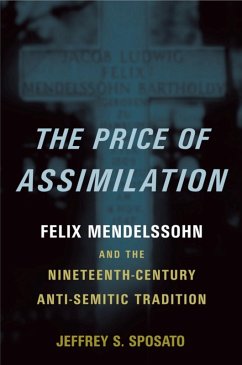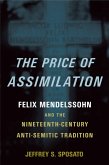Most scholars since World War Two have assumed that composer Felix Mendelssohn Bartholdy (1809-1847) maintained a strong attachment to Judaism throughout his lifetime. As these commentators have rightly noted, Mendelssohn was born Jewish and did not convert to Protestantism until age seven, his grandfather was the famous Jewish reformer and philosopher Moses Mendelssohn, and his music was banned by the Nazis, who clearly viewed him as a Jew. Such facts tell only part of the story, however. Through a mix of cultural analysis, biographical study, and a close examination of the libretto drafts of Mendelssohn's sacred works,
The Price of Assimilation provides dramatic new answers to the so-called "Mendelssohn Jewish question." Sposato demonstrates how Mendelssohn's father, Abraham, worked to distance the family from its Jewish past, and how Mendelssohn's reputation as a composer of Christian sacred music was threatened by the reverence with which German Jews viewed his family name. In order to prove the sincerity of his Christian faith to both his father and his audiences, Mendelssohn aligned his early sacred works with a nineteenth-century anti-Semitic musical tradition, and did so more fervently than even his Christian collaborators required. With the death of Mendelssohn's father and the near simultaneous establishment of the composer's career in Leipzig in 1835, however, Mendelssohn's fear of his background began to dissipate, and he began to explore ways in which he could prove the sincerity of his faith without having to publicly disparage his Jewish heritage.
Dieser Download kann aus rechtlichen Gründen nur mit Rechnungsadresse in A, B, BG, CY, CZ, D, DK, EW, E, FIN, F, GR, HR, H, IRL, I, LT, L, LR, M, NL, PL, P, R, S, SLO, SK ausgeliefert werden.









